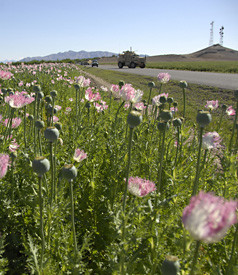By Nadia Prupis
Efforts by the United Nations (UN), the US military and the Indian government to curb opium production in Afghanistan since 2007 have been largely ineffective, due in large part to the ties between the drug trade and the Taliban.

Afghan National Security Forces patrol an opium field in Bala Baluk, Afghanistan. (Photo: U.S. Navy Petty Officer 1st Class Monica R. Nelson / isafmedia)
Afghanistan is the world's largest producer of opium, the raw material harvested from poppies to make heroin, as well as alkaloids like codeine and morphine. According to two cables released this month by WikiLeaks, Afghanistan's supply of opium exceeds the world's demand for heroin, with its unsold stock currently totaling 12,400 tons. Taliban-linked drug cartels emerging along the southern border of the country, where 99 percent of production takes place, influence the majority of poppy cultivation by coercing farmers into growing the crops for a strong and well-supplied insurgency.
According to Antonio Maria Costa, former executive director of the UN Office of Drug and Crime (UNODC), the cartels treat the excess stock like a "savings account," a practice that could pose a serious threat to peace efforts if it is used to fund the Taliban insurgency.
The UN released a report in October stating that Afghanistan's opium production dropped by nearly half from 2009 levels – however, the decrease was not due to military efforts, but rather the spread of a disease that affected opium fields in Kandahar and Helmand province after crops started to flower.
According to the report, poppy cultivation levels remained the same and were particularly high in the insecure southern and western areas. "These regions are dominated by insurgency and organized crime networks," UNODC executive director Yury Fedotov stated in a press release. "This underscored the link between poppy cultivation and insecurity in Afghanistan, a trend we have observed since 2007."
Costa told the North Atlantic Treaty Organization (NATO) during a September 2009 briefing that, "High cultivation trends were linked to the insurgency presence, particularly in areas with an absence of Afghan governance structures and security stability."
The drug trade in the south of the country is compounded by Afghan President Hamid Karzai's treatment of traffickers, including granting early releases to well-connected suspects. Karzai also pardoned five border police officers, who were caught with 124 kilograms of heroin and sentenced to serve 16 to 18 years in prison each, "on the grounds that they were distantly related to two individuals who had been martyred during the civil war."
In February 2007, then-President Bush told reporters in a speech that the United States was supporting Karzai in his efforts to end both the cultivation of opium and the corruption that compounds the country's drug trade. "[We're] helping the president in a variety of ways to deal with the problem," Bush said at the time. "One way to deal with the drug problem is for there to be a push back to the drug dealers, and a good way to push back on the drug dealers is to convict them and send them to jail."
Further complicating the drug trade in Afghanistan are the actions of the country's neighbors, particularly Pakistan, according to Afghan Minister of Defense Abdul Rahim Wardak. Wardak told Afghanistan Ambassador Karl Eikenberry during a December 2009 briefing that the Pakistani army was helping the Afghan Taliban find sanctuary in areas "deeper into Pakistan."
National Intelligence Estimates (NIE) reports released earlier in December concluded that the war in Afghanistan cannot be won without Pakistani forces helping to root out Taliban militants on their borders.
Foreign policy expert and Boston University professor Stephen Kinzer agrees that the drug trade in Afghanistan cannot be tackled solely as a US military issue. "Trying to curb the poppy production could be … a real serious interest of [the US]," Kinzer said. "However, like most of our problems in Afghanistan, this one cannot be solved by us alone. It can only be solved on a regional basis."
Ending heroin production is "a great example of a social and political interest that the US shared with Iran, but we're telling them if they don't cooperate on a nuclear issue, there will be no other cooperation. Our policy towards Iran is self-defeating," Kinzer said. "American military action alone, no matter how focused and how intense, is not going to change the situation in a substantial way."
Rather than fighting the cultivation through military efforts, Kinzer said, the US government should purchase the annual poppy crop from Afghan farmers for an estimated $3-4 billion a year – the same amount spent on the war in Afghanistan every month.
The AP recently reported that 700 soldiers died in Afghanistan in 2010, making it the deadliest year so far in the nine-year war. Much of the violence is centered in the southern part of the country, where the Afghan army being trained by US forces is often the main target of Taliban attacks.
Published on Jan. 6, 2010



